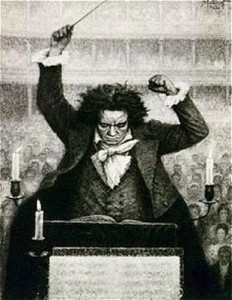
As any composer will tell you, we study quiet a bit. A good composer will never “tune out” but uses the background of social chaos as a protagonist for creation.
By 1800, Beethoven had become aware of his advancing deafness — surely a most horrible fate for a musician and unendurable to a composer. Agonizing over his fate, Beethoven contemplated suicide, but in the end embraced life, determined to go on composing, if no longer performing. Unhappy with his compositions up to that time and stating that he would now be “making a fresh start,” Beethoven began composing music such as had never before been heard. His Symphony no. 3 in E-flat major, subtitled the “Eroica”, was completed in 1804, and was almost twice as long as any symphony written up to that time. Taking the classical symphony as a starting point, it introduces more themes, more contrasts, more instruments, more weight and more drama than previously heard in the symphonic form.
